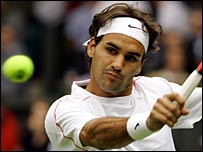
In the interests of variety in my writing avoidance behaviours, I've been watching Wimbledon. Tennis is one of the greatest of all spectator sports, because it speaks to the Ur-desire of the gladiator-deprived spectator to watch great skill wedded to War, while simultaneously compensating for their sports-wise weaknesses. For many sports (say, cricket or curling) it is difficult to be captivated unless you have a pretty good idea what the hell is going on -- especially having any kind of clue about which team or player is particularly good or impressive. (Unless, of course, the source of your captivation is the very obscurity of the endeavour, and I confess that this is sometimes very captivating indeed. But let us bracket this particular kind of spectator fetish). In the first place, tennis is damn simple. And in the second, when watching Federer, you really don't need to understand anything much at all to enjoy the impressive and surpassing brilliance of his game. Wow! Fast! My goodness! Nimble! He hit that ball with his arm all the way out to here! Criminy! How many mph was that again? Etc.
I love watching the tennis.
Like most nerds, I was not a fan of competitive sports as a kid. I was intimidated by them and withering about those who played them, I waxed lyrical (quietly, to myself) about their arbitrary pointlessness. That's pretty rich, coming from a philosopher, but I didn't know about my future in professional arbitrary pointlessness back then. So maybe, in ye olde comparison with Worthy Persons Making a Real Contribution (eg doctors with Medecins San Frontieres, cancer research scientists, primary school teachers, you know the deal), I have something in common with Federer today. But in addition to earning more money (in the sense where "more" is stretched to the point where it ceases to mean anything particularly much) and being much fitter (ditto "much") and, well, being able to play tennis, the difference that strikes me between me and Federer, or frankly any tennis player with even a hint, the merest sniff of an ambition to play professionally, is their grip on themselves. They literally can't play until their understanding of their own disappointment, insecurity, motivation, drive, aggression, envy, ability, self-regard, frustration, anything that might tweak the 150mph serve one degree to the left where it ought to be on the right, exceeds the power of those things to ruin their chances of winning. Sportspersons may be the most self-aware people on the planet.
I suck at this stuff. Dealing with a certain disappointment for me might be the work of a couple of days of mooching around pouting and reading Cadfael mysteries in the bathtub. I can go entire weeks after talking to a particularly smart person, wondering if my overall smartness is enough to get me to wherever it is that I'm supposed to be going (alert! Side issue). On days when I'm feeling especially good about myself and my philosophical thinking, I have a tendency to go outside and look at flowers or browse bookshops and smile a lot, rather than actually doing any philosophy, which I end up having to do on days of abject self-hatred instead.
Tennis is thoughtfully organised to give you various periods of time to manage your thoughts. You have between points, between games, between sets. And I suppose you have the nano-second or two before you have to get the ball in the centre of your graphite racket head. You can watch the players yank their thoughts into line while matter-of-factly dabbing their sideburns with the commemorative Wimbeldon sweat-towel, just like realigning the strings in their rackets. Two minutes, tops. And then they wander back out there as though they didn't lose the first set to the unseeded player. They're trained to do this! Why aren't I trained to do this? Of course, part of the story is that philosophy is not conducted in nano-second intervals, so you don't have to learn to deal with your shit in world-record time. You can kind of spread it around into all the gaps. You can tell your work to talk to the hand while you (don't) deal. You can do that in this discipline and still do pretty well. In fact, I tend to think that academics are aiding and abetting one another by making sure that you can spend a lot of time (not) dealing with your shit and still get along OK, because academics are often self-selected in needing a lot of time for shit-wrangling themselves, so they'd better not make it a precondition of success that you can deal with your shit on a world-class timetable.
Another part of the story is that tennis players wouldn't be as good at it as they are if there wasn't a lot of money in professional tennis, enough that it supports an entire industry of people to teach them how to get a hold of themselves in the time in takes the dude on the other side of the net to toss the green felty sphere in the air before they smash it over. I don't do what I do because I want to make a lot of money, but it would be very interesting if philosophy were lucrative enough to make it worthwhile for professional coaches to get philosophers out of their heads. If you know what I mean.


6 comments:
I might have thought of the pro athlete's talent more as one of a supremacy of physical self-control above all else, insofar as players not known for Vulcan levels of emotional suppression can make successful careers for themselves. Who knows.
I just console myself knowing that even though I'd need to live to be an active 200-year-old to earn what Federer's won on tour, at least bicycle commuting is keeping my BMI within spitting distance of his.
Isn't it a lot easier to be so self-aware about physical matters? I mean, there's a tangibility to it. Whereas how is one to be self-aware and confident and swaggering while facing the issue of philosophical skepticism? What bio-feedback machine would you hook yourself up to in order to find yourself there?
I've always thought one of the best things about any competitive sport is that there really is a clear sign of who's won and who's lost. Sure, the 15th ranked player can grumble and say to himself that he is a better player than Federer but just hasn't gotten the lucky breaks, or whatever, but there's clear tangible proof that he's wrong. I had not thought, exactly of your point that professional athletes learn so well how to deal with disappointment, which I think is a cool observation. And I think you're right, but then I also think that part of why they get to deal with observation is because they've got that clear, tangible evidence. There's not a whole lot of point for them to spend days moping about. Just practice their serve some more and get out there for the next match. A philosopher never gets such a clear-cut moment, and there's never such a clear-cut response to the disappointing moments. It's not like it's exactly true that you can just go out and practice your philosophizing some more and that will ensure more success.
Good points, Scriv.
Perhaps to put it another way, once you get out of dissertation jail, you'll have plenty of time to recover the ability to entertain Deep Thoughts.
All Federer can look forward to from this point, career-wise, is being knocked off his pinnacle by some strapping younger dude with well-developed forearm(s).
Very perspicuous thoughts, Scriv. I also feel that the performance feedback loop for athletes is much better, faster, and in many senses (although not all) what counts as success is definitive, which is not a luxury we have. But the achievement of success was not what I had in mind as a yardstick. I was thinking that even bad tennis players would exceed my self-management abilities. My sense is that while tennis is more physical than philosophy, the self-awareness of the athlete is no more "physical" than mine. Their disappointment and fear and general mind-fucking capability is just as mind-bound and intellectual as mine. And they learn to control it, use it, combine it with their technical skills or separate it off from them or a combination of these. The very defined reinforcement they get must help in teaching them to do this, but it doesn't seem to me to be notably different in kind from the interactions of my own mind-fuckery with my technical skills. Sometimes I wish that I, like them, had been forced to learn to work with my head-noise in order to get as far as I have. Other times I am glad that I have maintained an attitude of benign neglect. But not those nights when I'm wide awake at 4AM torturing myself.
You know, if you asked tennis players to write dissertations, I bet their self-management powers wouldn't look so all-fired impressive. I've got student athletes in my class who do amazing, impressive things preparing for games on Saturday, but they are sometimes still wracked with self-doubt just in the process of writing a 4 or 5 page essay.
That is terrifyingly true. I begin to suspect that your first point was the crucial one -- that the uncertainty and fuzziness in re: success in academic enterprise makes it impossible to have a controlled emotional attitude. If we got consistent messages, maybe we'd learn what worked. But we don't, we get all sorts of crazy stuff. I still don't know why some of my "good" stuff is good. *sigh* Anyone for tennis?
Post a Comment